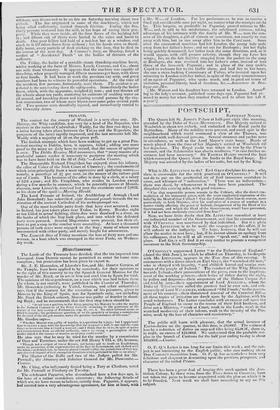fRierellantoug.
The Lords of the Treasury have decided, that the tea imported into Liverpool from Dantzic cannot be permitted to enter for home con- sumption ; but permission has been given to export it.
Mr. J. E. Hovenden, of Lincoln's Inn, and Mr. Hunter Gordon, of the Temple, have been applied to by somebody, for their opinions as to the right of this country to try the Spanish General Moreno for the murder of Mr. Boyd, or to arrest him and send him to Spain for trial, The opinions of these gentlemen, on a case which was laid before themn (by whom, is not stated), were published in the Courier of Thursday. Mr. Hovenden (referring to Vattel, Grotius, and other authorities) says, that if the warrant for the execution of his prisoners, given to Moreno by the King of Spain, was for Spaniards only, not including Mr. Boyd the British subject, Moreno was guilty of murder in shoot- ing Boyd ; and he recommends that the first step taken should be . . . .
..to ash' rem a petition to the K big, prayiog his Majesty to refer the matter to the Judicial Commit.ee of his Privy Council, according to the provisions of the statute of tie last session of Parliament, cap. 41, see. 4. No other tribunal seems so fitted to considee the preliminary question. as to the propriety of issuing a commission for the trial of the alleged murder, under the peculiar circumstances of this case."
Mr. Gordon says-
" Whether Moreno was guilty of murder, is a question for a jury; but I apprehend that to execute a man with the knowledge that the warrant is null, is one and the same tidal as to execute him without a warrant ; and I think that to do so, in spite of notice and remonstrance from an official authority. raises so strong a presumption of that malice which is the essence of mauler, as no jury could resist."
He also says that he may be tried for the murder by a commission of Oyer and Terminer, under the act 33d Henry VIII. c. 23; because,
"Though not a subject of Great Britain, yet having put to death an Englishman, under the protection of the representative of the Brit'sh Government, and clothed with the defehee of British law, he thereby placed I imselfu ithin the jurisdiction of that law, and di,ested himself of that exemption therefeom which pertained to him as an alien."
The Muster of the Rolls and two of the Judges polled for Mr. Pownall ; the Attorney and Solicitor General for Mr. Duncombe.— courier.
Mr. Ching, who indignantly denied being a Tory at Chatham, voted for Mr. Pownall at Finsbury on Tuesday.
. The celebrated Paganini, who disembarked here a few days ago, is the hero of a rather scandalous adventure; the following details of which are, we have reason to believe, strictly true. Paganini, it appears, had entered into a very advantageous agreement, for him at least, with
a Mr. IV—, of London. For his performances he was to receive a fixed and considei able sum per night, no matter what the receipts mieht be. This bargain, so profitable to l'aganini, proved ruinous to Mr. 1V--, and, to add to his misfortunes, the celebrated virtuoso, taking advantage of his intimacy with the family of Mr. W—, won the con- sent of his daughter, a girl of sixteen or seventeen, not exactly to run away with hint, but to run away after hint to the Cont:nent. Soon after the enamotrud musician had left London, the young lady stole away from her father's house, and set out for Boulogne; but her flight being quickly denounced, her father took the same direction, and, as it would appear, with still greater celerity, though they say Love has wings ; for, on the fair fugitive stepping from the packet on the quay at Boulogne, she was received into her father's arms, instead of into those of the love-sick Paganini ; and in place of the rosy urchin Cupid to welcome her to the Gallic shore, and lead her to her lover, she saw a stern.looking Commissary of Police, who insisted upon her returning to London with her father, in spite of the noisy remonstrances of an agent of Paganini, who spoke much, and in good set terms of violation, personal liberty, land of freedom, &c.—Annolateur de Bon- logne-sur-Mer. [Mr. Watson and his daughter have returned to London. Accottl- ing to the lady's account, published some days ago, Paganini had pr mised to marry her when they reached Paris, and to allow her -1,0t .V. a. year !]




















 Previous page
Previous page